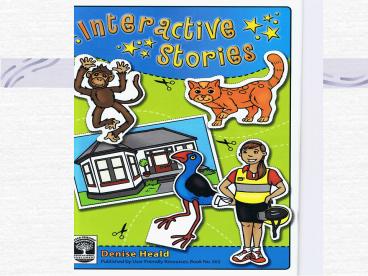Interactive Stories - PowerPoint PPT Presentation
1 / 23
Title:
Interactive Stories
Description:
Interactive stories are about combining storytelling and drama but at the same ... a sense of awe and wonder for the world they live in, altruism. empathy ... – PowerPoint PPT presentation
Number of Views:187
Avg rating:3.0/5.0
Title: Interactive Stories
1
(No Transcript)
2
- Humans have always told their children stories.
By imaginatively structuring and restructuring
experience we make it personally and culturally
meaningful (Brownlee, 1993).
3
- Interactive stories are about combining
storytelling and drama but at the same time
drawing out dispositions such as- - compassion for others,
- co-operation,
- helpfulness,
- a sense of awe and wonder for the world they live
in, - altruism
- empathy
4
- Interactive stories help to present information
and ideas in a different way. - They are an alternative means of describing and
communicating and allow children to contribute
their own knowledge about the world.
5
Benefits of reading to young children
- Stories are a central part of a childs learning
and development - Stories help children to understand their world
and make sense of their lives. - Through stories young children begin to organise
events that occur to or around them. - They also learn the essential skills needed to
read and write.
6
- Stories help children to define their
relationships to people and to the environment. - Children use stories to process and reflect on
their own experiences. - Stories are emotional experiences.
7
- Stories give children the words they need to
express what they are feeling, and a context to
help them understand those feelings. - In addition to building cognitive ability and
improving critical thinking skills, listening to
stories also helps children become more
confident, creative and resilient when faced with
day to day problems.
8
Childrens Narratives
- Research on narratives is based on Vygotskys
(1978) social interation approach which states
that humans are fundamentally social and cultural
beings and that any cognitive skills have a
social interactive origin. - The term narrative implies listening to and
telling or retelling stories about people and
events
9
- Storytelling builds vocabulary, enhances
imagination, increases story understanding, and
builds comprehension. - Research on brain development reveals that the
human brain stores and recalls information best
in story form. Stories offer multiple connections
that the brain can "grab" in order to absorb
information, thus allowing more rapid retrieval
and longer staying power.
10
Benefits of Drama
- The ability to pretend and to leave the real
world for a fictitious one, gives a different
viewing point from which to see the world to
discover, consider and make meaning of the world
from a safe perspective. - Drama gives children the opportunity to rehearse
imagined and real situations and to find
solutions to problems
11
- Drama helps children to develop self-esteem. It
teaches children about social co-operation and
group interaction. - Drama helps children understand others different
from themselves and allows them to put themselves
in anothers shoes.
12
- Helping children to act out their stories and
re-write more favourable endings, sometimes helps
children to cope with stress and trauma. - The use of fictional contexts puts children in
control by being able to use their existing
language, experience, motivations and interests.
13
- Combining storytelling and drama enables
children to - Participate
- Take on other perspectives
- Extend their thinking
- Extend their language skills
14
Principles of the Treaty of Waitangi
- Partnership
- Participation
- Protection
15
Links to Te Whariki
- Holistic Development
- Empowerment
- Family and Community
- Relationships
- Belonging
- Contribution
- Exploration
- Well-being
- Communication
16
Relationships
- Between children and children
- Children and adults
- Adults and adults
- Children and the natural world
17
Family and Community and Belonging
- The stories are mostly based on New Zealand
contexts, wild-life etc and affirm for children
that this is the place where we live, this is
where I belong. - They draw on everyday contexts such as events
like going to kindergarten for the first time.
The stories also depict people in the community
such as the post woman.
18
Empowerment and Contribution
- The stories can easily be adapted and changed.
- Teachers are encouraged to ask children to
predict what might happen next and to go with
their suggestions. - This empowers children when they take control of
the story
19
Holistic Development, Communication and
Exploration
- The stories may lead to further exploration of
the topics that are presented, for example, the
elephant story may inspire a project on the
natural habitat of jungle animals. - This helps to extend childrens thinking and
language abilities. - These stories help children to identify emotional
states such as happy, sad, and satisfied.
20
Well-being
- Storytelling is an emotional event and one that
can be exciting, soothing, or sad. - When children participate in these stories and
have a part to play, there is a sense of
satisfaction and of achievement.
21
Props
- These can be made by the children and/or the
teachers or bought cheaply from the 2 shop. - Some of the stories illustrate the importance of
protecting the environment and use animals as
props. These can be bought cheaply from second
hand stores.
22
Writing your own stories
- Actively listen to children to hear their
stories. - Traditional and familiar stories can be easily
dramatised. - Learning stories can be developed into story and
drama episodes and may also develop into other
projects.
23
- www.userfriendlyresources.co.nz
- www.maestros.co.nz
- Whitireia Community Polytechnic































